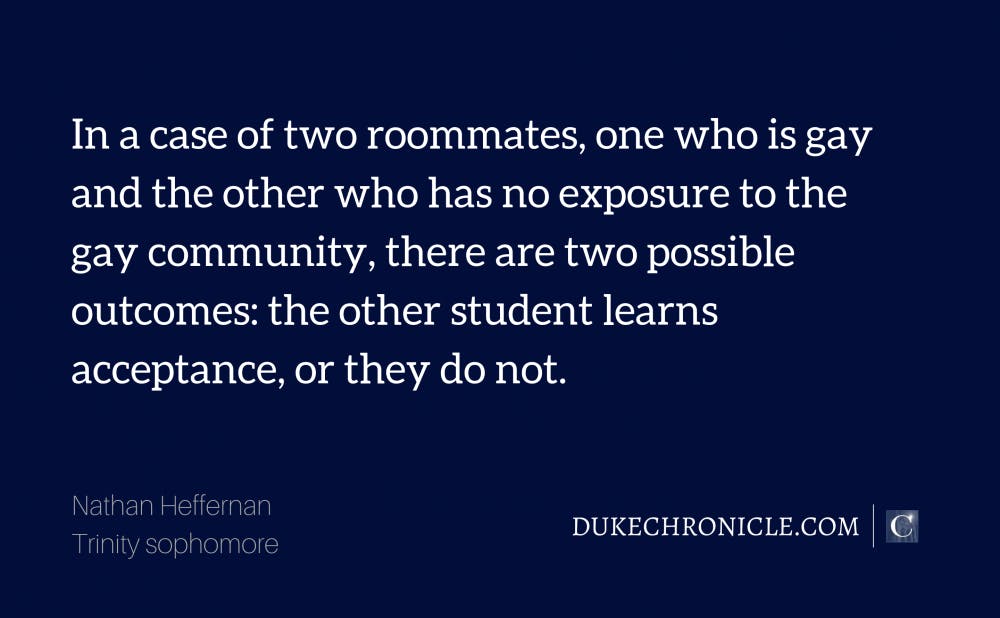Last Spring, Duke announced that incoming first-year students, aside from those in varsity sports, would no longer have the option to choose a roommate. By dissolving the roommate selection option, administrators hoped that students from different backgrounds could be forced to live in the same 100-square foot room for an entire year and thus learn from each other. This decision was controversial, as some agreed with the housing decision and others said it placed a burden of education on students with marginalized identities. While I agree that the benefits of randomized housing can be substantial, I am concerned for the first-years who are now tasked with being a lesson in tolerance for their roommates. For this piece, I am going to focus mainly on gay male students, as that is the perspective I understand most—although many other minority groups will experience similar issues.
In the months prior to my first semester at Duke in the fall of 2017, my class GroupMe and Facebook were fairly active, with students posting autobiographical entries in hopes of finding a roommate or friends. A student, probably a Prattstar, created a Google spreadsheet for male students looking to choose a roommate. The spreadsheet contained categories like intended major, Trinity or Pratt, interests, sleep schedule, and political affiliation. As more excessive categories began to be added, I thought it would be funny to add a “Kinsey scale’ category in the spreadsheet. This addition sparked confusion. Once it was explained as a scale for sexual orientation with one being exclusively heterosexual and six being exclusively homosexual, incoming first-years began to put their respective numbers down.
Eventually, my idea was rightfully criticized as being irrelevant and problematic, so it was changed to “are you comfortable with having a gay roommate?” since many felt this question was more useful. I chuckled when I first saw it, as I assumed that most Duke students would be tolerant enough to have a gay roommate. I personally was not concerned with my roommate being homophobic and was content with going random. But much to my surprise, many students began to put down “I’d prefer not” or “not sure” in the box asking if they were comfortable with having a gay roommate. Seeing those responses made me reconsider going random and shifted my anxiety from having an untidy roommate to having a homophobic one.
A dorm room is an intimate place where two or three students, away from home for potentially the first extended period of time, must cohabitate and work together harmoniously. It is an easy area to create tension and conflict, but can also be a fun space of peace. For LGBT first-year students arriving to their dorm room, their rooming assignment can be surrounded by fear and anxiety. Although blatant homophobia is typically frowned upon on Duke campus, students can still harbor anti-gay sentiments. And even if a roommate is not explicitly bigoted towards LGBT individuals, they can still have discomfort with living in close quarters with someone who identifies as LGBT.
I understand how homophobic all-male spaces can be, as I grew up in them. I played hockey, was in Boy Scouts for a brief stint, and spent some time living in Texas. In many areas of the U.S., anti-gay sentiments are not an anomaly but a default. When I meet a brand-new person, I tend to behave under the assumption that they could be homophobic. To believe that most students arriving to Duke are innately LGBT-allies would be idealistic and out-of-touch. Hopefully, by the end of our years here we could all be allies for marginalized groups, but that takes time and education. And while having a friend with a certain identity is one of the best ways to break down bigotry towards people with that identity, a dorm room can be too intimate of a place for that growth to safely happen. In a case of two roommates, one who is gay and the other who has no exposure to the gay community, there are two possible outcomes: the other student learns acceptance, or they do not. There is a potential for the straight student to grow as a person, but this is not guaranteed. On the flip side, there is absolutely no benefit for the gay student. Either they successfully teach their roommate not to hate gay people, or they live in an uncomfortable environment until something changes. LGBT students do not need the lesson of living with straight people, since they have been doing just that for most of their lives.
Even though I talked mainly about the extremes of a gay/straight roommate situation, there remains plenty of space between hatred and acceptance. A straight roommate could be tolerant of LGBT individuals in general, but still be uncomfortable with their roommate bringing home a same-sex partner. These problems persist, even after first-years have attended True Blue. As a Resident Assistant on East, I will be checking up on my LGBT residents over the course of the year, as I am sure many other RAs will do. I expect the majority of roommate situations to fare on the positive side, but I have spoken with many LGBT students who have come here concerned. If you are straight and have an LGBT roommate, make sure that your communal space is always a home for them. Understand that they are an individual with a specific set of life experiences that cannot sum up their entire community. Learn from each other, but try not to make them have to teach you a painful lesson.
Nathan Heffernan is a Trinity sophomore. His column runs on alternate Tuesdays.
Get The Chronicle straight to your inbox
Signup for our weekly newsletter. Cancel at any time.

